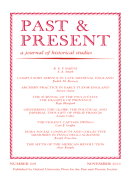Academic journal
 | |
| Discipline | History |
|---|---|
| Language | English |
| Edited by | |
| Publication details | |
| History | 1952–present |
| Publisher | Oxford University Press on behalf of the Past and Present Society (United Kingdom) |
| Frequency | Quarterly |
| Impact factor | 2.188 |
| Standard abbreviations ISO 4 (alt) · Bluebook (alt) NLM (alt) · MathSciNet (alt | |
| ISO 4 | Past Present |
| Indexing CODEN (alt · alt2) · JSTOR (alt) · LCCN (alt) MIAR · NLM (alt) · Scopus | |
| ISSN | 0031-2746 (print) 1477-464X (web) |
| LCCN | 65077388 |
| JSTOR | 00312746 |
| OCLC no. | 265436895 |
| Links | |
Past & Present is a British historical academic journal, which has been a leading force in the development of social history. Founded in 1952, the journal is published four times a year by Oxford University Press on behalf of the Past and Present Society, a British historical membership association and registered charity. The society also publishes a book series (Past and Present Publications), and sponsors occasional conferences and appoints postdoctoral fellows.
The current chair of the editorial board is Joanna Innes, the Winifred Holtby Fellow and Tutor in Modern History at Somerville College, University of Oxford.
History
After the end of the Second World War, an emerging subfield of social history gradually became popular in history departments.
Past & Present thus emerged in 1952 as an alternative to mainstream political history journals. It was founded by a combination of Marxist and non-Marxist historians, including John Morris. The Marxist historians included members of the Communist Party Historians Group, including E. P. Thompson, Christopher Hill, Eric Hobsbawm, Raphael Samuel, Rodney Hilton, and Dona Torr. Gordon Childe was a founder member of the board. The journal previously had the subtitled A Journal of Scientific History. These figures often advocated History from Below in explaining the history of class, labour, and social relations.
Morris was the editor from 1952 until 1960 and remained as chairman of the editorial board until 1972.
Past & Present was simultaneously influenced by the Annales school of historians, which aimed to write history in its totality.
The History Workshop movement, founded in the 1960s, aimed to become a platform for the study of "ordinary people". The influence of Past & Present greatly expanded in the historical discipline after the publication of Thompson's The Making of the English Working Class in 1963.
See also
References
- "The Past and Present Society, registered charity no. 802281". Charity Commission for England and Wales.
- Griffin, Emma (2 February 2015). "Working-Class History". History Today. Vol. 65, no. 2.
After the end of the Second World War, an emerging subfield of social history gradually became popular in history departments.
- Woolf, Daniel (2011). A Global History of History. Cambridge University Press. p. 485.
- Wickham, Chris (2006). "Andrew Sherratt". Past & Present (193): 3–5. doi:10.1093/pastj/gtl025.
- MacRaild, Donald; Taylor, Avram (2004). Social Theory and Social History. Macmillan International Higher Education.
- The Great War in Post-Memory Literature and Film. Berlin: Walter de Gruyter GmbH & Co KG. 2014. p. 64.
- "Dr J. R. Morris: Studies in ancient history (obituary)". The Times. 10 June 1977. p. 18.
- "Past and Present". Making History.
Further reading
- Hill, Christopher; Hilton, R.H.; Hobsbawm, E.J. "Past and Present. Origins and Early Years". Past and Present, No. 100. (Aug., 1983), pp. 3–14.
- Le Goff, Jacques. "Past and Present. Later History". Past and Present, No. 100. (Aug., 1983), pp. 14–28.
External links
This article about a history journal is a stub. You can help Misplaced Pages by expanding it. See tips for writing articles about academic journals. Further suggestions might be found on the article's talk page. |